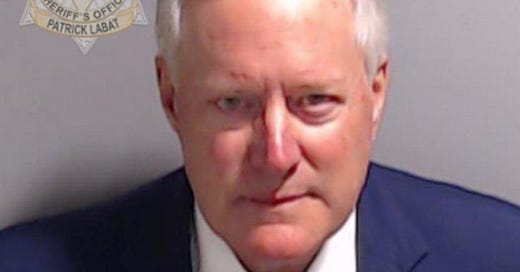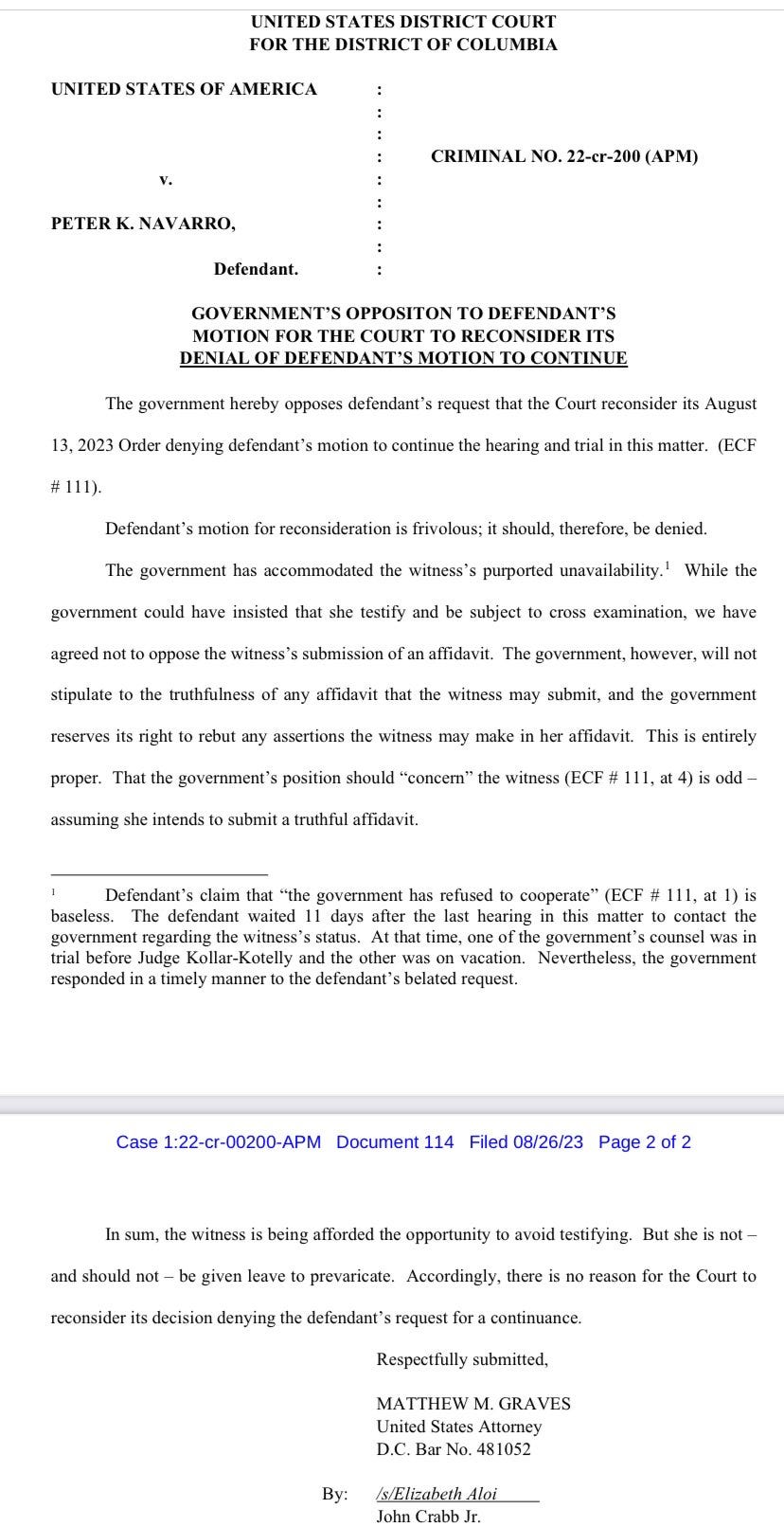This is another one of those weeks where there is so much going on that if you blink, you’re going to miss something. We’ll try to stay on top of everything here, because it can be hard to predict where the most interesting action will take place.
For instance, on Monday, Trump’s last chief of staff, Mark Meadows, gets a hearing in federal court in the Northern District of Georgia on his motion to remove Fani Willis’ state court prosecution to federal court. This is an evidentiary hearing, and it’s entirely possible that Judge Steve Jones could take evidence with ruling or even intimating which way he’s leaning from the bench. He may share some sense of how he’s inclined to rule after hearing the evidence. It’s also possible he could be prepared to rule from the bench, although that’s less likely, since he’ll be hearing the evidence for the first time in court.
Meadows probably has the best case for removal of any defendant. That’s not to say it’s a sure thing, it’s just that if any defendant has a case for removal, it’s him. His lawyer—he’s capably represented by former Deputy Attorney General George Terwilliger (George H.W. Bush administration)—spelled out why in his reply brief. He argued that the chief of staff is always acting in his official capacity, and that even when the president is on a personal trip, the chief of staff is required to be there, performing official functions. Terwilliger argues Meadows never got to take that official duties hat off, even when accompanying Trump.
That argument begs the ultimate question here. There’s a three-part test for removal: 1) is the individual a government official; 2) were they acting in their official capacity when they committed the conduct they are charged with; and, 3) do they have a “colorable” federal defense. Meadows was a federal official and he has immunity defenses he could present, although they may not ultimately carry the day. But as we’ve discussed before, the Judge isn’t supposed to consider whether they are winners, only whether Meadows has something that passes the smell test.
That means that the strongest argument against Meadows’ bid for removal is establishing that Meadows was acting for the campaign. If he was doing the work of the presidency, his “official” job, he’s likely entitled to removal. But the White House has no responsibility for the individual vote counts in the states, which is what Meadows was inserting himself into. That’s the work of candidate Trump, not President Trump, and not a part of his official duties. As we’ve discussed, that’s a highly nuanced argument that will be made in a legal context that is pro-defendant. We’ll wait to see how the judge is leaning Monday, but keep in mind that this issue is likely headed on pre-trial appeal to the 11th Circuit and even to the Supreme Court before the issue is decided.
Meadows’ case is stronger by a nudge than Trump’s, who hasn’t filed a motion to remove yet—he has at least until 30 days after he’s arraigned, which won’t happen until early September—because of this narrow area where the president is acting in his personal capacity while the chief of staff remains on duty. And Meadows’ argument is stronger than the Georgia state officials, whose argument is that they were acting under the direction of a public official, which the statute includes as a grounds for removal, but is a much more difficult argument to make out.
It’s possible that Trump has decided he doesn’t want to remove the case. He may like the young, Republican-appointee judge in state court in Fulton County more than the Obama-appointee in federal court, who has a reputation for being fair and thorough, and who didn’t hesitate to deny the legally meritless requests made by Meadows and former DOJ lawyer Jeff Clark to prevent their arrests. There’s not much of an advantage to Trump in terms of jury either—a federal jury would be drawn from the counties surrounding metro Atlanta, and the makeup of that jury pool isn’t significantly more “Trump friendly” than Fulton County itself. (Although, as you already know, I disagree with the notion that juries decide cases the same way that voters in their area vote.) Trump may be letting Meadows forge ahead to see how he does, or he may have decided to forego a federal prosecution. In my mind, the significant disadvantage to a federal trial is the absence of cameras in the courts, which we’d have in the Fulton County Courthouse. Trump, with his love of center stage, may view that as a disadvantage too. It’s possible he’s hoping Meadows will prevail and letting him carry the water on this issue, at least for now.
Judge Jones has scheduled a hearing for later in the month on removal petitions by Jeff Clark and some of the state defendants.
To make matters still more interesting, Judge McAfee, in state court, has set the first Georgia trials for October 23, 2023. So far, that involves two of the Trump lawyers, Kenneth Chesebro and Sidney Powell. Trump was quick to file a motion to sever his case from theirs—we know his forever strategy here is delay, so that’s no surprise. And in a case where the district attorney asked each defendant to provide her with media with a storage capacity of 2 terabytes so she can provide them with the first round of discovery, it’s unlikely the judge will force anyone who doesn’t want to to go to trial that quickly to do so. Increasingly, it’s likely the Georgia case will be tried in at least two tranches. So there are lots of moving pieces, some of which may get sorted out this week, as to where and when Fani Willis’ case will proceed.
Also on Monday, Federal Judge Tonya Chutkan in the District of Columbia will hold a pretrial conference in Special Counsel Jack Smith’s election interference case, where Trump is the lone defendant. She’s expected to set a trial date for the case. The government has asked for a trial date of January 2, 2024, noting that they expect trial to take four to six weeks. Trump doesn’t want a trial until April 2026, which is to say, never. The Judge has the final say.
Also this week, sentencing hearings in the Proud Boys case, as well as for three defendants convicted in the Oath Keepers case, will take place in federal court in Washington, D.C. The Proud Boys’ sentences will be important in and of themselves, as they involve some of the most direct violence involved on January 6. But they will also provide a benchmark of sorts for how Trump and others may be ultimately sentenced if they are convicted. Judges in related cases are encouraged by the rules and like to, as a matter of practice, engage in proportional sentencing, where, those most culpable for a crime receive the highest sentence, and those lower down are sentenced more lightly.
Federal prosecutors recommended sentences of 27 to 33 years in prison for four members of the Proud Boys, including, at the high end, the group’s former chairman Enrique Tarrio, who were convicted of seditious conspiracy for their roles in the attack on the Capitol. If the Judge agrees, they would be the longest January 6 sentences imposed to date.
A lawyer for two of the Proud Boys defendants has argued for leniency for his clients, Joseph Biggs and Zachary Rehl, telling the court that the chaos on January 6 was fueled by Trump’s false election claims, and that his clients “believing the commander in chief and heeding his call should yield some measure of mitigation.” But prosecutors have asked the court to apply a “terrorism enhancement,” which would warrant a longer sentence, arguing that the the Proud Boys sought to influence the government through “intimidation or coercion.” Lengthy sentences here could influence Trump’s ultimate fate if he is convicted.
Also this week, Peter Navarro, who served as an assistant to Trump while he was in office, wants a continuance for an evidentiary hearing scheduled for Monday and for the start of his trial in early September. DOJ charged Navarro, after the House January 6 committee referred his contempt matter to them, with one count for his refusal to appear for a deposition before the committee and another involving his refusal to produce documents. He was a self-proclaimed organizer of the “Green Bay Sweep” plan, which was supposed to have brought together Republican members of Congress to block the Electoral College vote count by repeated challenges to various state's vote counts. MSNBC host Ari Melber, upon hearing Navarro’s explanation of the plan on air, pointed out that what Navarro was describing was a coup.
Navarro has repeatedly tried to delay his trial and been rebuffed by the court. The most recent claim is that one of his witnesses is unavailable because she’d just had a baby.
DOJ smacked back, pointing out they had agreed to permit the witness to file an affidavit, waiving their right to cross examine her. But they hit pretty heavy in regards to being able to argue she was not being truthful, nonetheless. The gist of their position is contained in this brief pleading:
Trial is scheduled to being on September 5.
That’s a lot for one week, and it’s likely by the time we get to Friday, there will be more. I appreciate all of you for being here and doing the hard work of understanding how our legal system works and why it matters. Trump, like all other criminal defendants in our system of law, remains innocent until proven guilty. That’s because, despite his best efforts, we’re still a rule of law country. Let’s all do our best to keep it that way.
We’re in this together,
Joyce






You know, I read every word you say. Sometimes, it's hard for me because I have no understanding of the law. So I feel confused and in over my head. But I will keep at it because slowly but surely, I'm starting to understand things much more deeply than I have before. And for that I deeply thank you. I believe the times demand we all try harder to understand what, to our minds, does not come easily. I promise not to give up.
Gosh 27 to 33 years that is a life sentence for these men. Things are getting interesting. Let's go Fani and Jack!